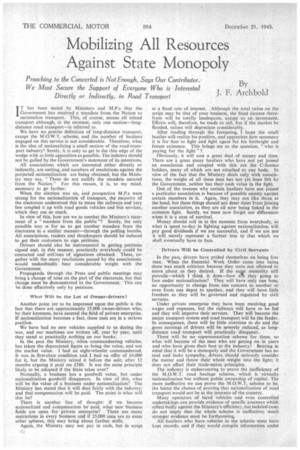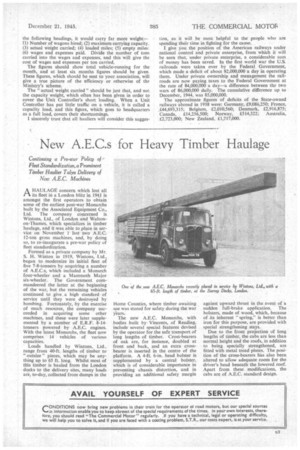Mobilizing All Resources Against State Monopoly
Page 28

Page 29

If you've noticed an error in this article please click here to report it so we can fix it.
Preaching to the Converted is Not Enough, Says Our Contributor. We Must Secure the Support of Everyone Who is • Interested Directly or Indirectly, in Rood Transport
By j. F. Archbold
IT has been stated by Ministers and M.P.s that the Government has received a mandate fromthe Nation to nationalize transport. This, of course, means all inland transport although, at the moment, only one section—tongdistance road transport—is referred to.
We_ have no precise definition of long-distance transport, except the M,O.W.T, scheme, and the number of hauliers engaged on this service is not considerable. Therefore, what is the idea of nationalizing a small section of the road-transport industry? Surely, it is only to get in the thin edge of the wedge with as little opposition as possible. The industry should not be gulled by the Government's statement of its intentions.
All associations which are interested either directly or indirectly, are uniting, and numbers of resolutions against the projected nationalization are being obtained, but the Ministry may say, "These do not nullify the mandate secured from the Nation." For this reason, it is, to my mind, necessary to ge, farther.
When the election was on, and prospective M.P.s were strong for the nationalization of transport, the majority of the electorate understood this to mean the railways and very few coupled it up with road goods vehicles and bus services, which they use so much.
In view of this, how are we to combat the Ministry's statement of a "mandate from the public "? Surely, the only possible way is for us to get another mandate from the electorate in a similar manner—through the polling booth's. All associations, traders and shopkeepers should be induced to get their customers to sign petitions.
Drivers should also be instrumental in getting petitions signed and, in this manner, practically everybody could be -contacted and mil:ions of signatures obtained. These, together with the many resolutions passed by the associations, would undoubtedly bear considerable weight with the Government.
Propaganda through the Press and public meetings may bring a change of tone on the part of the electorate, but that change must be demonstrated to the Government. This can be done effectively only by petitions.
What Will he the Lot of Owner-drivers?
Another point yet to be impressed upon the public is the fact that there are approximately 25,000 owner-drivers who, by their keenness, have entered the field of private enterprise. If nationalization becomes a fact, these men are in a serious position.
We have had no new vehicles supplied to us during the war, and our machines are written off, year by year, until they stand at practically nothing on our books.
In the past the Ministry, when commandeering vehicles, has taken the depreciated figure as being the value, and not the market value. I had an eight-wheeler commandeered. It was in, first-class condition and I had an offer of £4,000 for it, but the Ministry 'seized it before the sale; after 12 months arguing it paid me £580. Is not the same principle likely to be adopted if the State takes over?
Normally, a business has a goodwill value, but under nationalization goodwill disappears. In view of this, what will be the value of a business under nationalization? The Ministry has stated that it will deal fairly with the industry, and that compensation will be paid, The point is what will this be?
There is another line of thought: if we become nationalized and compensation be paid, what new business fields are open for private enterprise? There are many restrictions in every business and if 25,000 men are to enter other spheres, this may bring about further strife.
Again, the Ministry may not pay in cash, but in script at a fixed rate of interest. Although the total value on the script may be that of your business, the fixed income therefrom will be totally inadequate, except as an investment. Efforts will, therefore, be made to sell, but if the market be flooded, values will depreciate considerably.
After reading through the foregoing, I hope the small haulier willrealize his position, and appreciate how necessary it is for him to fight and fight again for his birthright and future existence. This brings me to the question, "who is paying for the light " ?.
Obviously, it will cost a great deal of money and time. There are a great many hauliers who have not yet joined an association and coupled with this are the C-licence holders, many of which are not attached to any body. In view of the fact that the Ministry deals only with associations, the weight of all these men has not yet been felt by the Government, neither has their cash value in the fight.
One of the reasons why certain hauliers have not joined a particular association is because of possible enmity against certain members in it. Again, they may not like those at the head, but these things should not deter them from joining another association, as they are all now being linked in the common fight. Surely, we must now forget our differences when it is a case of survival.
Money should roll in at the moment from everybody, as what is spent to-day in fighting against nationalization will pay good dividends if we are successful, and if we are not it will merely represent a further loss to that which we shall eventually have to face.
Drivers Will be Controlled by Civil Servants
In the past, drivers have prided themselves on being free men. When the Essential Work Order came into being there was much criticism because they were not allowed to move about as they desired. If the sate mentality still prevails—which I think it does—how a they going to fare under nationalization? They will have only one boss, no opportunity to change from one concern to another or even from one depot to another, and they will have little freedom as they will be governed and regulated by civil servants.
Under private enterprise they have been receiving good wages and expenses, but the railways will have to be fed and they will imprOve their _services. They will become the major transport system and road transport will be the feeder. In consequence, there will be little overtime to do and the gross earning 's of drivers wilt be severely reduced, as longdistance road transport will practically disappear.
There will be no superannuation scheme for them, so what will become of the men who are getting on in years and who have given their best to the industry? Bearing in mind that it will be a monopoly and the Government has no soul and lacks sympathy, drivers should seriously consider the matter and throw their whole weight into the fight; it does not affect their trade-union principles.
The industry is endeavouring to prove the inefficiency of the M.O.W.T. road haulage scheme, which is •virtually nationalization but without public ownership of capital. The more ineffective we can prove the M.OW.T. scheme to be, the better the chance of proving that nationalization of road transport would not be in the interests of the country.
Many operators of hired vehicles and even controlled undertakings can provide evidence of specific journeys which reflect badly against the Ministry's efficiency, but isolated cases do not imply that the wholescheme is ineffective; much stronger evidence must be forthcoming. • All .hauliers who have vehicles in the scheme must have kept records, and if they would compile information under the following headings, it would carry far more weight:– (1) Number of wagons hired; (2) maximum carrying capacity, (3) actual weight carried; (4) loaded miles; (5) empty miles: (6) wages and expenses paid. Divide the number of tons carried into the wages and expenses, and this will give the cost of wages and expenses per ton carried. The figures should show total vehicle-running for the month, and at least six months figures should be given. These figures, which should be sent to your. association, will give a true picture of the efficiency or otherwise of the Ministry's scheme.
The "actual weight carried" should be just that, and no the capacity weight, which often has been given in order to cover the Unit Controller's short loading. When a Unit Controller has put little traffic on a vehicle, it is called a capa6ty load, and this figure, which goes to headquarters as a full load, covers their shortcomings.
I sincerely trust that all hauliers will consider this sugges
tion, as it will be most helpful to the people who are spending their time in fighting for the cause. I give you the position of the American railways under national control and private enterprise, from which it will be seen that, under private enterprise, a considerable sum of money has been saved. In the first world war the U.S. railroads were taken over by the Federal Government, which made a deficit of about $2,000,000 a day in operating them. Under private ownership and management the railroads are now paying taxes to the Federal Government at the rate of $4,000,000 a day—a difference between the two wars of $6,000,000 daily. The cumulative difference up to December, 1944, was 85,000,000.
The approximate figures of deficits of the State-owned railways abroad in 1938 were Germany, £9,086,250; France, £44,693,315; Belgium, £2,010,560; Denmark, £2,916,875; Canada, £14,256,500; Norway, £514,322; Australia, £2,723,000; New Zealand, £1,711,000.




























































